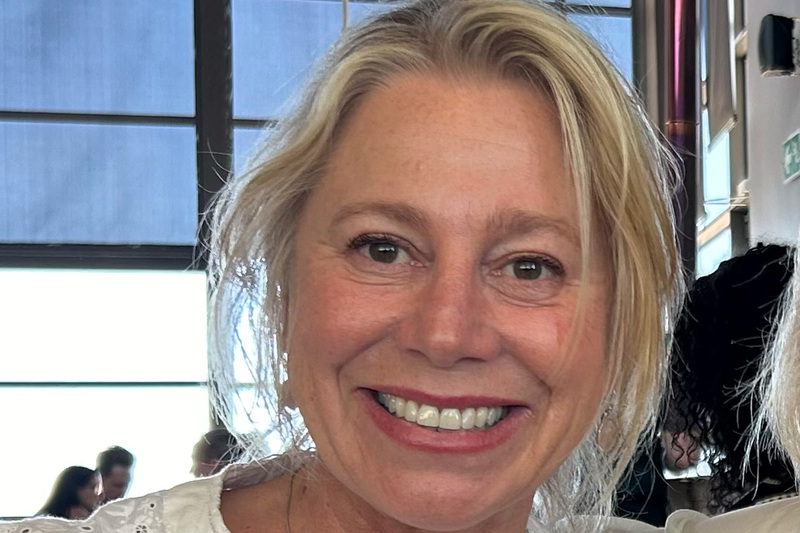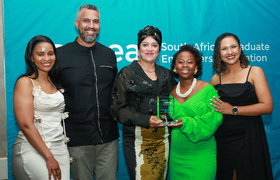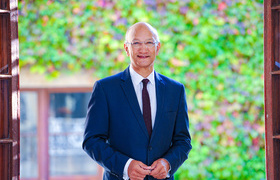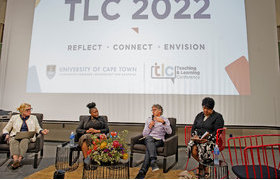How UCT’s reimagined BCom opened doors to second chances
24 November 2025 | Story Lyndon Julius. Photo Supplied. Read time 8 min.
When Ali Meadows, senior lecturer in the University of Cape Town’s (UCT) Faculty of Commerce, reflects on the BCom in Management Studies degree – the programme she helped redesign, convenes, and has poured nearly two decades of her career into – she does not talk about accolades or institutional recognition.
The BCom in Management Studies degree team was recently recognised for their excellent work, receiving the Vice-Chancellor’s Excellence Award in the Transformation category for 2025.
Meadows talks about students. Their fortitude. Their commitment. Their challenges. Their futures. And the quiet, steady belief that every student deserves a pathway to success.
“I’m so proud of how so many students have been in a complicated situation and they’ve graduated,” Meadows said softly, almost overwhelmed by the memory of countless young people reclaiming their confidence. “I love that. I love it so much.”
It is precisely this student-centred approach and deep humility that have earned the team this award. The programme has not only reimagined how a commerce degree can be structured but also how a university can respond to shifting student needs with empathy, innovation, and academic rigour.
Said the dean of the Faculty of Commerce, Professor Suki Goodman: “The faculty could not be prouder of this award. The fact that it was awarded to a department/faculty affirms the collaborative efforts of many colleagues in moving it from a paper-based plan to an actionable strategy. Ali’s perseverance in championing the degree deserves recognition, as does the support she received from colleagues, and the enabling environment crafted by the head of the School of Management Studies, Associate Professor David Maralack; and our deputy dean for undergraduate affairs, Professor Ulrike Rivett.
“I must mention that this is the second time the School of Management Studies has won this prestigious award. The Section of Marketing collectively won the inaugural award in 2019. Another example of colleagues pulling together to bring about change and transformation.”
For Meadows, a long-serving staff member in the faculty, the recognition was unexpectedly emotional.
“I never expected to be recognised for my work. It is the most humbling, humbling thing.”
It was her colleague Associate Professor James Lappeman who nominated Meadows for the award and first contacted her to ask whether she had seen his email.
“When I received the message about the award, I burst into tears,” Meadows said. “I never expected to be recognised for my work. It is the most humbling, humbling thing. To be recognised by the people I have so much respect for is a moment I will cherish for a very long time.”
Later that evening, she finished the very last drop of her late father’s favourite single malt to mark the moment.
“As a solutions-driven engineer, he would have been so proud,” she said. “It felt right to share that moment with him.”
The problem that sparked a transformation
To fully understand the power of this award, one must understand the problem the programme set out to solve. For over 20 years, Meadows worked closely with first-year commerce students.
Students often choose a specialisation or degree because their parents or guardians encouraged them to. Others selected a degree simply because they were “good at maths” or had heard the title in passing. Many students also arrive as “first-in-family students”, without an in-depth understanding of the university ecosystem or sometimes onerous progression rules.
Many students realise too late that they are in a degree unsuited to their strengths. They either drop out or are unable to progress in that degree. And, most heartbreakingly, students can face academic exclusion.
“Students were moving into funnels that didn’t reflect their realities.”
“Commerce degrees have become increasingly structured,” Meadows explained. “Over time, it has become more difficult to move from one degree to another. And when things go wrong – failing just one prerequisite course – they could be set back an entire year.”
The system, she realised, was inadvertently punishing uncertainty – something no first-year student should be penalised for. The need for an alternative structure became impossible to ignore.
“How can we expect an 18-year-old to make such a massive decision when they’ve had little or no career guidance? Students were moving into funnels that didn’t reflect their realities.”
A bold redesign with flexibility in structure
The redesigned programme, initially conceptualised in 2012 but redesigned in 2023/4 as part of the faculty-wide curriculum review process, was the result of Meadows mapping the BCom curriculum against every degree in the faculty. The outcome was a new model that combined structure with flexibility – or as she describes it, shifting from a “set menu” to a “guided buffet”.
“We created a degree where students could play to their strengths, adjust their direction without penalty, and graduate with a robust BCom qualification,” she explained. “It was about giving them space to figure things out.”
The changes included:
- mobility pathways between Economics, Accounting, Finance, Statistics, Actuarial Science, Marketing, and more
- advising as a central pillar – not an afterthought; student advising, not just curriculum advising
- alternative progression routes to prevent cascading failures and exclusion
- a curriculum that adapts to the future of work, with breadth at its core and depth in the electives.
In an era where careers shift rapidly and industries evolve overnight, Meadows emphasises the importance of developing graduates who can adapt. Students also create a degree of agency as they reflect on their chosen pathways.
“We have no idea what the future of work looks like in 10 years. So, we need graduates with breadth and flexibility; people who can move between roles, industries, and contexts with confidence.”
Impact at scale
The numbers reveal the reach of the programme:
- 799 graduates to date
- 334 who directly benefited from restructured pathways and support.
Hundreds more have avoided exclusion, regained confidence, or discovered new academic passions. But the true story lives in the students’ voices – students who found hope and a future.
Matlhatsi Kaole enrolled for the degree after being excluded from the mainstream commerce programme. The programme’s flexibility allowed her to rebuild both her academic record and her confidence. She now works in asset management and is completing postgraduate studies in finance. “In a moment when I had lost hope, the degree became my lifeline,” said Kaole.
After struggling to choose a degree that matched her interests, Sithembiso Gugulethu Mbatha found the programme offered exactly the balance she needed; a balance between people, numbers, and business. Today, she is an educator, a board representative, an author, and a co-author of a new maths literacy textbook.
“I could make my degree unique to me and my future aspirations,” Mbatha proudly said. “I would not have completed my degree without the academic advice from Ali Meadows.”
Behind the scenes with a community of care
The award, said Meadows, not to her alone but to a network of committed individuals – too many to mention individually: Commerce deans who trusted her vision; the deputy dean of Commerce; various heads of department; and academic collaborators like Pieter Botha in Actuarial Science and Asief Dhansay in the College of Accounting; Fazlyn van der Schyff, the receptionist, who is seen by many students as a first point of comfort and support; and programme convenors across the faculty who identify pathways for students into the degree.
“A degree like this requires the support of the whole faculty,” Meadows noted. “It’s not just me. It’s an incredible team of people, both inside and outside the School of Management Studies. The whole EDU [Education Development Unit] team and the advisors. The team in the faculty office. Everyone is working together.”
Meadows ended with heartfelt advice: “If they’re not happy or succeeding in their degree programme, they need to speak up. There are pathways. There are options. There is always a way forward. If they are smart enough to get into UCT, they are smart enough to graduate. The trick is identifying the best match for them.”
 This work is licensed under a Creative Commons Attribution-NoDerivatives 4.0 International License.
This work is licensed under a Creative Commons Attribution-NoDerivatives 4.0 International License.
Please view the republishing articles page for more information.










